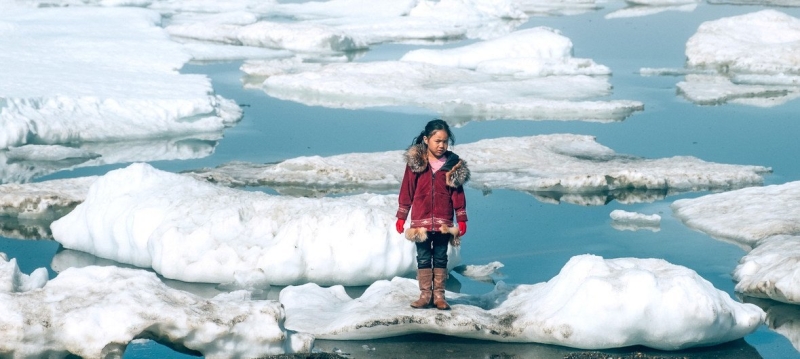
An Inupiat girl stands on an ice floe on the shore of the Arctic Ocean in Barrow, Alaska. (Archive) UN: Climate change adaptation funding needs to be increased exponentially Climate and Environment
At the upcoming UN Climate Conference in Baku, COP29, countries must dramatically step up their efforts to adapt to climate change and commit to funding, according to a report released today by the UN Environment Programme (UNEP).
The global average temperature increase is approaching 1.5 degrees Celsius above pre-industrial levels, and the latest estimates indicate that the world is on track for a catastrophic increase of 2.6 to 3.1 degrees Celsius this century unless action is taken immediately and significantly to reduce greenhouse gas emissions.
The report notes that there is also an urgent need to significantly scale up adaptation to climate change this decade. However, this is hampered by huge gaps in adaptation financing.
Adaptation Now
“Climate change is already harming communities around the world, especially the poorest and most vulnerable. “Storms are wiping out homes, fires are destroying forests, and land degradation and drought are degrading landscapes,” said Inger Andersen, UNEP Executive Director.
“People, their livelihoods and the nature they depend on are in real danger from the impacts of climate change… there is simply no excuse for the world not to adapt now,” she added.
International adaptation finance flows to developing countries have increased from $22 billion in 2021 to $28 billion in 2022, the largest year-on-year increase since the Paris Agreement.
The gap is huge
UNEP experts note that this is significant progress, but at the same time emphasize that it is not enough. The adaptation finance gap is estimated at $187-359 billion per year.
The losses of developing countries associated with climate change are growing, with many of them burdened with huge debts. Effective and adequate adaptation is more urgent than ever.
The report calls on countries to step up efforts by setting a new collective climate finance target at COP29 and by integrating more effective adaptation measures into national plans.
Country Efforts
Currently, 171 countries have at least one national adaptation planning instrument – a policy, strategy or plan. Of the 26 countries without a national planning instrument, 10 are not developing one. Seven of these countries are affected by conflict or fragility and require significant targeted support.
Many countries report progress in implementing their national adaptation plans, but find that the scale and speed of adaptation are insufficient in light of growing climate risks. Additional efforts will be needed to implement the UAE Framework for Global Climate Resilience.
Increasing Financing
Given the scale of the problem, bridging the adaptation finance gap will require innovative approaches to mobilizing additional financial resources.
Such approaches could include the creation of funds and financing mechanisms, climate budgeting and climate budget labeling. They could be supported by reforms of international financial institutions and multilateral development banks.
The report also calls for the creation of a database in this area, including monitoring and assessment data on capacity and technology needs, approaches to work and their actual costs.
